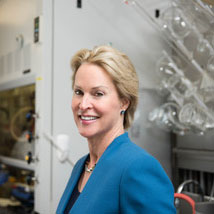
Frances Arnold will give the 2019 Francis Crick Lecture on Thursday 18th July at 4.00pm in the LMB’s Max Perutz Lecture Theatre. The title of the lecture is ‘Innovation by evolution: bringing new chemistry to life’. The event is open to anyone in the local area who is interested in attending.
Frances is currently the Linus Pauling Professor of Chemical Engineering, Bioengineering and Biochemistry at the California Institute of Technology, where she has been on the faculty since 1986. She pioneered directed protein evolution and has used those methods for applications in alternative energy, chemicals, and medicine. Her lab is currently working on expanding enzyme activity, driven by mechanistic insights, by repurposing diverse existing proteins and their promiscuous functions for new chemistries. They are also engineering enzymes to produce valuable building blocks for the synthesis of bioactive compounds and continuing to develop protein engineering methods.
Frances received her B.S. in Mechanical and Aerospace Engineering from Princeton University and worked at the Solar Energy Research Institute, a national laboratory devoted to alternative energy research (now NREL) before obtaining her Ph.D. in Chemical Engineering from the University of California, Berkeley. Frances received the Charles Stark Draper Prize of the US National Academy of Engineering in 2011, the US National Medal of Technology and Innovation from President Obama in 2013, and the Millennium Technology Prize in 2016. She is the first American woman to win the Nobel Prize in Chemistry, awarded in 2018. She has been elected to all three US National Academies of Science, Medicine, and Engineering.
Lecture abstract:
Not satisfied with nature’s vast catalyst repertoire, we want to create new protein catalysts and expand the space of genetically encoded enzyme functions. I will describe how we can use the most powerful biological design process, evolution, to optimize existing enzymes and invent new ones, thereby circumventing our profound ignorance of how sequence encodes function. Using mechanistic understanding and mimicking nature’s evolutionary processes, we can generate whole new enzyme families that catalyze synthetically important reactions not known in biology. Recent successes include selective carbene insertion to form C-Si and C-B bonds, and alkyne cyclopropanation to make highly strained carbocycles, all in living cells. Extending the capabilities and uncovering the mechanisms of these new enzymes derived from natural iron-heme proteins provides a basis for discovering new biocatalysts for increasingly challenging reactions. These new capabilities increase the scope of molecules and materials we can build using synthetic biology and move us closer to a sustainable world where chemical synthesis can be fully programmed in DNA.
Background Information:
The Francis Crick Lecture is named in honour of LMB Nobel Laureate Francis Crick. It is one of a series of named lectures organised by the LMB to be given by eminent scientists from around the world.
Francis was born in 1916 in Northampton. He studied physics at University College London. His PhD work was interrupted by World War II, during which he worked on the design of acoustic and magnetic mines for the British Admiralty. In 1949 he joined Max Perutz’s MRC Unit in Cambridge. It was here that he helped solve the structure of DNA and initiated work on the genetic code. In 1976 he moved to the Salk Institute, California. He immersed himself in trying to define how we are aware of things – consciousness. He continued with this until he died, defining the important goal of trying to find a neuronal correlate of consciousness. He died in San Diego on 28 July 2004.